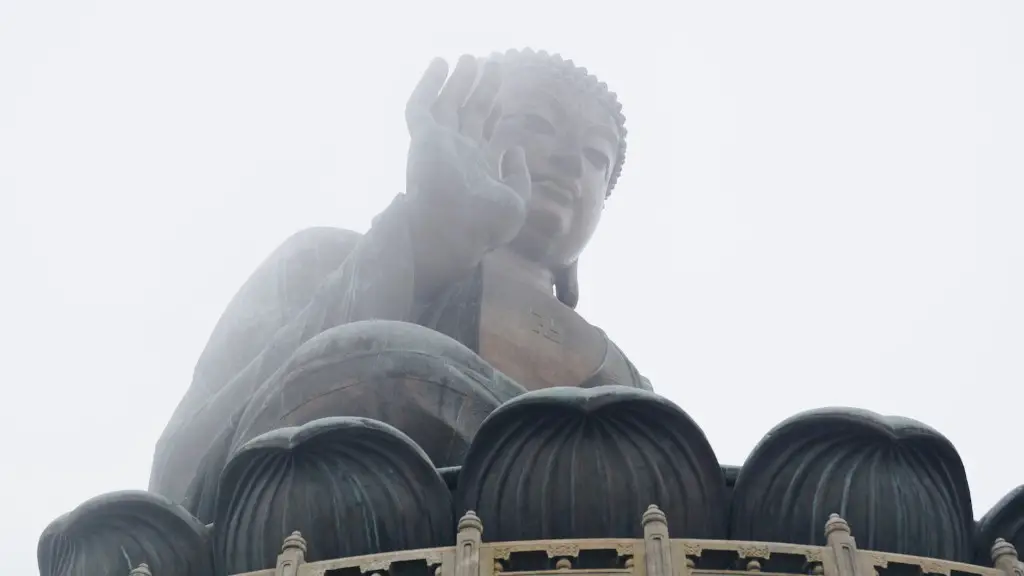There are a few maintenets of Buddhism, which include the Four Noble Truths, the Eightfold Path, karma, and reincarnation. The Four Noble Truths state that life is full of suffering, that suffering is caused by desire, that suffering can be ended by stopping desire, and that this can be accomplished by following the Eightfold Path. The Eightfold Path is a path of right conduct, right understanding, right speech, right action, right livelihood, right effort, right mindfulness, and right meditation. According to Buddhist beliefs, good deeds lead to good karma, and bad deeds lead to bad karma. Karma is the belief that what goes around, comes around. So, if someone does good deeds, they will receive good karma in return. If someone does bad deeds, they will receive bad karma in return. It is believed that after someone dies, their soul is reborn into another person or animal. This cycle of rebirth is called reincarnation.
There are many different schools of Buddhism, and so there are many different answers to this question. In general, however, Buddhists believe in the Four Noble Truths, the Eightfold Path, and the Three Jewels. The Four Noble Truths teach that suffering is inherent in life, that it has a cause, that it can be ended, and that there is a path to follow to end it. The Eightfold Path lays out eight principles for living a moral and meaningful life, and the Three Jewels are the Buddha, the Dharma (the Buddha’s teachings), and the Sangha (the community of monks and nuns).
What are the top 5 beliefs of Buddhism?
The five precepts are basic guidelines for living a moral and ethical life according to the Buddhist tradition. They are commitments to abstain from killing living beings, stealing, sexual misconduct, lying and intoxication. Within the Buddhist doctrine, they are meant to develop mind and character to make progress on the path to enlightenment.
The precepts are not meant to be taken literally, but rather as general principles to live by. For example, the first precept against killing does not mean that Buddhists are vegetarians. Rather, it is a commitment to respect all life and to avoid causing harm to others.
Buddhists believe that by following the precepts, one can purify one’s mind and develop wisdom and compassion. Ultimately, the goal is to awaken to the true nature of reality and to live in harmony with all beings.
These are the three universal truths that everyone must come to accept in order to live a happy and fulfilling life. 1 Everything is impermanent and changing 2 Impermanence leads to suffering, making life imperfect 3 The self is not personal and unchanging.
What are the 7 pillars of Buddhism
The Seven Factors of Awakening are important mental capacities in Buddhist tradition. Also known as “inner wealth”, these factors are mindfulness, investigation, energy, joy, tranquility, concentration, and equanimity. Each of these factors contributes to a person’s overall wellbeing and spiritual development.
The Four Noble Truths are a central teaching in Buddhism that are accepted by all schools. They state that suffering is a part of life, that there is a cause of suffering, that there is an end to suffering, and that there is a path to the end of suffering. These truths have been the subject of extensive commentary and are a central part of Buddhist teaching.
What is the highest moral virtue in Buddhism?
The term for ethics or morality used in Buddhism is Śīla or sīla (Pāli) Śīla in Buddhism is one of three sections of the Noble Eightfold Path, and is a code of conduct that embraces a commitment to harmony and self-restraint with the principal motivation being nonviolence, or freedom from causing harm. The Pali Canon contains three primary sources of guidance for monks concerning proper conduct: the Patimokkha, the Mahavagga, and the Cullavagga. Śīla is also discussed in many secondary sources such as the Visuddhimagga.
The Four Noble Truths are the essence of Buddha’s teachings, though they leave much left unexplained. They are the truth of suffering, the truth of the cause of suffering, the truth of the end of suffering, and the truth of the path that leads to the end of suffering. These truths are important because they provide a framework for understanding the human condition and the way to liberation from suffering.
What are the 10 rules of Buddhism?
The Ten Grave Precepts are a set of guidelines for living a moral and ethical life. They are based on the teachings of Buddhism and emphasize the importance of taking care of oneself and others. The precepts are:
1. Respect life – Do not kill
2. Be giving – Do not steal
3. Honor the body – Do not misuse sexuality
4. Manifest truth – Do not lie
5. Proceed clearly – Do not cloud the mind
6. See the perfection – Do not speak of others’ errors and faults
7. Realize self and others as one – Do not elevate the self and blame others
The Eightfold Path is an important religious and philosophical teachings that originated from the Buddha. The path consists of eight practices, also known as the ” Noble Eightfold Path “. These practices are designed to help an individual to see the world in a different, more positive light and to live a more meaningful and ethical life.
Who are the 3 main Buddhist gods
These are three of the most popular and important Buddhas in Mahayana Buddhism. Vajrapani is known as the ‘Lord of Secrets’, and is said to be an manifestation of the Buddha’s power. He is often shown holding a vajra, or thunderbolt, and is sometimes considered to be the protector of the Buddha. Manjushri is the Buddha of wisdom, and is often shown holding a sword which cuts through ignorance. He is said to be the teacher of the Buddha. Avalokiteshvara is the Buddha of compassion, and is often shown with many arms, each holding a different object to help suffering beings.
The 10 precepts of Buddhist morality are:
1) to refrain from taking life
2) to refrain from taking what is not given
3) to refrain from sexual misconduct
4) to refrain from speaking falsehoods
5) to refrain from intoxicants which lead to carelessness
6) to refrain from taking unduly large meals
7) to refrain from dancing, singing, music and other entertainment
8) to refrain from using cosmetics, garlands, perfumes
9) to refrain from using high or spacious seats
10) to refrain from accepting gold or silver
These precepts are intended to create a basic code of ethical conduct to which all Buddhists can aspire. They are not intended to be a exhaustive list of all moral actions, but rather a starting point from which each individual can develop their own practice.
What is the moral code of Buddhism?
Ethical behavior leads to an enlightened mind because it allows a person to see the interconnectedness of all things and to act in ways that are in harmony with that interconnection. An enlightened mind also flows from ethical behavior, because acting ethically is a way of attuning oneself to the natural order of things and getting in touch with one’s own deepest nature.
It is important to abstain from taking life because all living beings have a right to life. Taking life is an act of violence and it goes against the natural order of things. When we kill another living being, we are causing suffering and we are disrupting the harmony of life.
What is the biggest sin in Buddhism
Ānantarya Karma, or Ānantarika Kamma, is the most serious offence in Buddhism. At death, through the overwhelming karmic strength of any single one of them, they bring immediate disaster. Both Buddhists and non-Buddhists must avoid them at all costs.
The ten unwholesome actions are negative actions that should be avoided in order to live a wholesome life. These actions include taking life, taking what is not given, sexual misconduct, lying, sowing discord, harsh speech, idle gossip, covetousness, and others. By avoiding these actions, we can live a more positive and wholesome life.
Do Buddhists consume alcohol?
It is widely known that Buddhism discourages the consumption of alcohol. This is because alcohol consumption can lead to addictive behaviors and can cause negative physical and mental health effects. Early Buddhists texts state that ingesting alcohol is a breach of the monastic precepts. For lay Buddhists, alcohol consumption is also discouraged as it can hinder one’s spiritual practice.
There is no universal ban on tattoos in Buddhism, as there are in some other religions. Many Buddhists believe that the body is impermanent, and so are tattoos. Because they are viewed as temporary, getting tattoos doesn’t violate any Buddhist doctrines or beliefs.
Conclusion
There are four main tenets of Buddhism: the Four Noble Truths, the Eightfold Path, karma, and reincarnation.
Buddhism is a religion based on the teachings of Siddhartha Gautama, who was born in present-day Nepal in the 6th century B.C.E. According to Buddhist tradition, Gautama achieved enlightenment, or nirvana, after meditating for many years. He then shared his insights with others, and they became the basis for the Buddhist religion.
The main tenants of Buddhism are the Four Noble Truths and the Eightfold Path. The Four Noble Truths teach that life is suffering, that suffering is caused by desire, that suffering can be ended by giving up desire, and that there is a path to freedom from suffering. The Eightfold Path is a guide for how to live in a way that will end suffering. It includes living with wisdom, understanding, compassion, and altruism; acting with integrity, honesty, and reliability; and practicing meditation and mindfulness.

